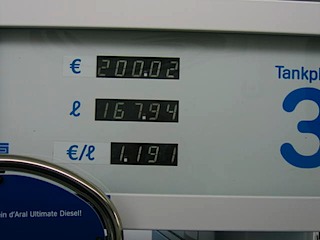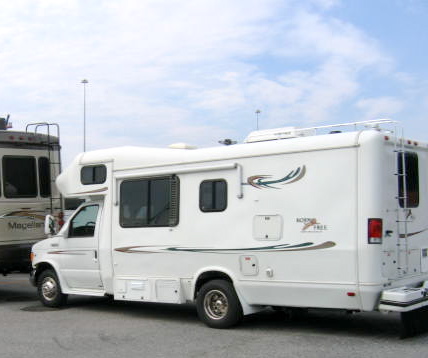As promised--if that’s the word--here’s a midterm assessment of the outcomes of our various expectations about this trip: which ones, so far, have been exceeded, which met, and which shattered beyond all recognition.
(“Midterm,” “assessment,” “outcomes”. . . how deep runs the influence of decades in American higher education. But we’re doing our best to get over it.)
So, in the terms of our epigraph from Henry James--
“My idea of paradise is a perfect automobile going thirty miles an hour on a smooth road to a twelfth-century cathedral."--
we begin.
“A perfect automobile . . .”
B+ on this one. As near as we can tell, Rover has been averaging about 10 mpg, which is all we can expect; mechanically, she’s been flawless in the crucial areas.
We can’t be sure about the mpg because until recently we weren’t willing to fill the 55-gallon gas tank once, let alone twice, because of the cost of lugging that much extra weight around. However, just today when we left Luxembourg we filled it up because gas there was € .30 per liter cheaper than anywhere else we’d been--that’s about $1.60 per gallon less.  And it’s beginning to look like we’ll make it through the two months of our trip on a single tank of propane.
And it’s beginning to look like we’ll make it through the two months of our trip on a single tank of propane.
One of the tires needs about 3 lbs of added pressure every two days or so, and the hydraulic levelers sometimes snap and groan disconcertingly--but at least they don’t give way. Most annoying has been the water heater: it sometimes fails to come on at all, and other times it warms the water initially but then fails to keep it up. This afternoon we took out the manual and poked and tapped it a bit, after which it burned energetically and we went inside to eat supper and drink wine . . . we’ll see whether we’ve done any long-term good. (I hope so, because everything else the manual suggests is about 3 semesters above me and, as the Luxembourgean motorhome repair guy said, “I have no parts for this.”)
“ . . . going thirty miles an hour . . .”
There’s no way around it: the grade so far is F.
The original plan had been to travel backroads at a leisurely pace and to stop for the night in small towns as the spirit moved us. Instead, we’ve usually been on the European equivalent of interstates--and now that we’re in France, they’re tollroads to boot--going 55 mph, while everyone else does 75 or so. Today might have been our worst in this regard: 170 miles from Luxembourg city to Strasbourg, France. We had hoped to go about 50 miles a day.
I think there are a number of reasons we haven’t done this. First, ever since leaving our relatives in northern Holland, we’ve had rain most every day. Backroads and hills and narrow lanes are no fun to drive on in those conditions, and I’ve succumbed to the false hope that if we only go fast and far enough, we will outrun the bad weather. Second, I’ve been very aware of our three water tanks--black, grey, and fresh--and the need to prevent the first two from getting full and the third from getting empty. So no sooner does the monitor’s level for one another of the tanks threaten to become critical in a couple of days than I start thinking we have to find a campground where we can fill one kind of tank or empty another.
Finally, I haven’t yet been able to shake my Type-A habit of ‘get it done,’ ‘check one destination off the list and go on to the next,’ instead of taking it as it comes.
“ . . . on a smooth road . . .”
A. Maybe A+. Except for a short stretch in western Germany, the highways have been great, and even the narrowest lanes have been smooth. The oval “USA” decal next to our rear license plate seems to elicit other drivers’ pity and forebearance rather than impatience (not to mention a lot of interest from people at restaurants and gas stations and campgrounds).
“ . . . to a twelfth-century cathedral.”
B so far--but on the other hand, we’ve only today gotten into France, the country of literally hundreds of ancient cathedrals, town halls, and villages… (Cathedrals like this one at Strasbourg?
That would be too much to hope for.)
Still, some of our best memories so far have been turning a corner in a Dutch or Belgian town and having our breath taken away by the sudden sight of a centuries-old Grote Kerk or Town Hall at the far end of the market square--and this despite the fact that Reformation Protestants or the 20th century’s two wars often had done terrible things to towns’ architecture in these countries.
One of our wisest purchases so far was a three-day “Luxembourg Card,” which gave us unlimited travel on the buses and trains throughout the country as well as free admission to more than 50 museums and other attractions. Because we had the card, we saved energy riding a bus when otherwise we might have walked, and we weren’t particularly upset when one of the museums we took a bus to was putting in a new exhibit and had everything off limits. And we saw a couple of interesting museums we otherwise probably would have skipped for the sake of saving money.
We’ve just finished a four-night stay in a campground just on the edge of Luxembourg city. This was the first camppground that wasn’t filled with permanent and rather crummy looking trailers. Instead there were people coming in and going out every day. And we could order fresh bread to be available in the morning. The laundry was only € 4 to wash and dry and the campgound was only € l3 with free showers.
